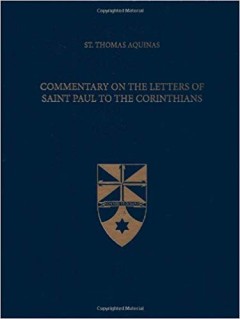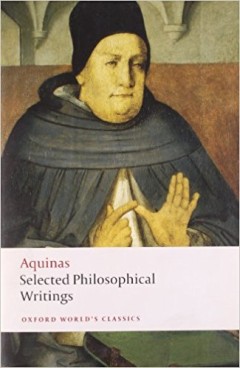Ditapis dengan

Commentary On The Letters Of Saint Paul To The Corinthians
Although Thomas Aquinas's influence over philosophy endures to this day, the medieval genius did not consider himself a philosopher, but a Scripture scholar. The Aquinas Institute's hardcover Latin-English editions of Aquinas's commentaries on the Letters of St. Paul make many of these commentaries available in English for the first time.The bilingual format makes the work of this intellectual …
- Edisi
- First Published
- ISBN/ISSN
- 978-1-62340-001-9
- Deskripsi Fisik
- x + 631 pgs.; 28,5cm.
- Judul Seri
- -
- No. Panggil
- 227.207 AQU c

Selected Philosophical Writings
St. Thomas Aquinas (1225-1274) saw religion as part of the natural human propensity to worship. His ability to recognize the naturalness of this phenomenon and simultaneously to go beyond it--to explore, for example, spiritual revelation--makes his work as fresh and readable today as it was seven centuries ago. This accessible new translation offers thirty-eight substantial passages not only f…
- Edisi
- -
- ISBN/ISSN
- 0192865858
- Deskripsi Fisik
- xxxv + 452 pg.; 19,5 cm.
- Judul Seri
- -
- No. Panggil
- 189.4 AQU s

Commentary On The Book of Causes
The Book of Causes, highly influential in the medieval university, was commonly but incorrectly understood to be the completion of Aristotle's metaphysics. It was Thomas Aquinas who first judged it to have been abstracted from Proclus's Elements of Theology, presumably by an unknown Arabic author, who added to it ideas of his own. The Book of Causes is of particular interest because themes tha…
- Edisi
- -
- ISBN/ISSN
- 0813208432
- Deskripsi Fisik
- xxxvii + 193 pg.;21,5 cm.
- Judul Seri
- -
- No. Panggil
- 122 THO c
 Karya Umum
Karya Umum  Filsafat
Filsafat  Agama
Agama  Ilmu-ilmu Sosial
Ilmu-ilmu Sosial  Bahasa
Bahasa  Ilmu-ilmu Murni
Ilmu-ilmu Murni  Ilmu-ilmu Terapan
Ilmu-ilmu Terapan  Kesenian, Hiburan, dan Olahraga
Kesenian, Hiburan, dan Olahraga  Kesusastraan
Kesusastraan  Geografi dan Sejarah
Geografi dan Sejarah